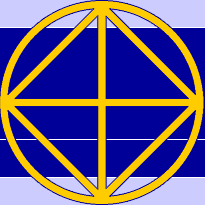Book Presentation
"The Wisdom of Pythagoras"
by Dr. Ekkirala Krishnamacharya

Pythagorean wisdom unfolds itself through initiates who function as souls. It cannot be learned in classrooms through intellect. It needs to be lived in life and that needs firm resolve. Master E.K. is one such example of an initiate who lived the Ageless Wisdom in its manifold form. He gave a glimpse of the Pythagorean wisdom to a group of seekers in Paris in 1983.
The teachings contained in this book help the readers to understand the oneness of the Ageless Wisdom expressed differently at different places and at different times. The aim is to accomplish spiritual fusion of East and West. It also gives an initiate's approach to wisdom.
Content: Foreword; Introduction, Life and Events; Teachings of Pythagoras; The Pythagorean Keyboard; The Pythagorean Triangles; The Tetractys; The Pythagorean Numbers and Cycles of Creation; The Lord of Numbers and the Lord of Shape; Commentary on the Aphorisms of Pythagoras; The Pythagorean Community.
Dhanishta, E-08016 Barcelona, 1991. ISBN 84-88011-02-4
Sample:
Chapter II: Teachings of PythagorasLet us get into a few angles of the vision of Pythagoras and his own particular way of expressing the truth. Today, let us go into the teachings which were essentially humorous nature, yet very, very deep.
1. It is the duty of every spiritual student to reduce one fool in this Creation before he dies and that is oneself. He should also see that there is one more wise man on this Earth, and that is also oneself. Afterwards you can do whatever you want. This is the minimum that is expected of a spiritual student.
2. One who has no mastery over his time, mind, senses, thoughts and ideals, is a slave to every creature in this world.
Until we have mastery over our own time, any fool on the street can use us. That is what Pythagoras meant by this teaching. There is a lot for us to think about this proposition. I think it will take more than a decade before we can understand the full significance of this statement because it all depends upon how we understand our time and life span. We do not understand the significance of our span of life, how quickly it is spent away, how speedily it goes away and how it is ill-spent. Unless we grow aware of this, we cannot understand and appreciate this statement fully.
We spend time aimlessly. We spend many evenings and nights at the club. The card player spends evenings, nights, and mornings. The whole week-end is spent in this way, and what is the result ... ? So, Pythagoras means that wisdom is contentment. Any activity that is not capable of causing satisfaction to you, is only a mechanical activity. The human machine has its own wear and tear. We cannot compensate for the time we waste because when our span is spent, let it be one minute, one hour, or one day, it cannot be brought back to do something better. We are to do only with the remaining span and any time ill-spent Is gone forever. If money is spent, we can earn it again, if property is lost, we can gain it once again; if an opportunity is wasted, we can get it again; but, if the time is spent, our span of life is spent and there is no watch or clock to bring it back again. So, the more we try to understand the importance of life, the more we feel serious about this statement of Pythagoras.
3. Seeking knowledge is running after yourself; your shadow runs with you.
When you run in the sun, your shadow runs with you. If your face is turned toward the sun, your shadow is at your back and it follows you. But if you face your shadow, the sun is at your back and you have to follow the shadow. The shadow runs in front of you. Your shadow is your body and its needs. That is what Pythagoras taught.
I personally feel that we have to spend one full span of life before we can understand this teaching completely. We have to offer our mind to this thought and live a life before we can understand its significance fully. The body is made up of flesh, it has its own desires, appetites, the taste for food and drink, the need for rest, for sleep, for sex, etc. Beyond these needs, there are desires that are utterly false. For example, there is a need for food, but there is also a desire for food, a need to drink and a desire to drink, a need to sleep and a desire to sleep, the need to work, but a desire to do work which we like, and there is the need for sex and the desire for sex. So, we should be able to know the demarcation line.
Need is true, desire is utterly false. When you are behaving with the needs of yourself, you are facing the sun. The sun means the spirit in you, the light, the source of enlightenment in you, the original source of illumination in you which is the content of the soul. The soul and the spirit put together, form the unit of light in you. Facing the sun means living in awareness of the soul and the spirit. It is called a continuous God Awareness. When you are living in your own awareness, Pythagoras says, you are facing the sun; then your desires and the body are behind you. When you live as soul and spirit, when you are identified with the spirit, then you are no more identified with your body. Your body is only a shadow. But because it is provided by Nature to serve you as a vehicle, it has a few needs which you are expected to fulfil. Beyond that everything is desire. If you are interested in it, then you are facing your shadow. We are trying to serve our body from morning to evening. For example, when we render service to our hair or to our skin with the help of many perfumes and cosmetics, rendering faithful service to every part of the skin and up to every hair on our head down to the boots we are polishing. So, from head to foot, we are rendering a 24 hours service. The result is that we live as life-long servants of our hair, skin, garments and shoes. This is what is called running after the shadow; in which case, your sun will be behind your back.
This explanation covers only a part of his statement. Everyone has to meditate and find out some more for himself.
4. Let there be a noon to everyone. Only when it is noon you have no shadow either behind, or before. He says: 'Let there be a noon to you", and then he explains what noon is. When the sun is over your head, it is called the point of initiation. It is also technically called by him the time of High Twelve. He had two peculiar terms: High Twelve and Low Twelve. That is, when you are standing on this Earth, if the sun is above your head, it is called the High Twelve, that is the noon. When the sun is below your boots, it is called the Low Twelve or the zero time.
There are also two more points: the east, where the sun rises and the west where the sun sets. These four are called the four cardinal points of the day. Even during the high twelve, only when you stand erect, can you avoid the shadow. That means, unless you stand erect mentally and morally, the shadow exists. This is what is called straight living. This was coined by Pythagoras as the Verticals.
Straightforward nature: straight thinking, straight speaking and straight doing, represent the Verticals. For example: If you like someone you should say: “I like you". If you don't like someone you should say: “I don't like you". But don't tell somebody that you don't like a third person. Instead of doing that, you tell it straight to that person himself. If you speak negatively of a person in his absence, it is not called straightforward nature or vertical living. The Verticals represent personal virtues and personal discipline.
Pythagoras also defined the Horizontals as representing the social virtues or our social behaviour toward the society. For example: compassion, love and tolerance are called the social or horizontal virtues needed for interaction with the society. He called the Verticals, the plumb, and the Horizontals, the spirit level. These are called the implements even by the masons of Freemasonry: however, they are used only as oral symbols for one hour every month in the lodges. Unless the vertical of the plumb and the horizontal of the spirit level are practised In daily life, one cannot claim to be a mason or a builder.
Oral practice of symbols remains a mockery without their practical application in life. The practitioners of these symbols in life are the builders of the society who have no claims. When Pythagoras called them the Implements of Masonry he meant the operative masons not the speculative masons. In Freemasonry we boast of being speculative masons and not operative masons. So, we are as useless as dust unless we are operative masons and unless we put into practice these virtues in our daily life. For many years we may be members of a ritualistic society. We may try to observe the ritual only in the ritual hall and not in life. Then we are only speculative masons. Absolutely useless because we are not building any temple on the solid plane.

 Circle of Good Will
Circle of Good Will Contact
Contact
